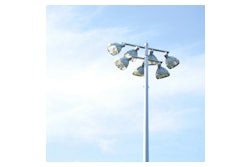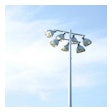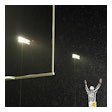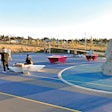A Connecticut law reinforces a trend to adopt alternative field-care options.

Beginning next month, public school district officials in Connecticut's 169 municipalities will be forced to adopt that theory. At a high-profile ceremony in June, Gov. M. Jodi Rell signed a bill extending a pesticide ban from day-care facilities and elementary schools to middle school lawns and playing fields. The law requires pesticide use to be phased out by July 2009, with administration and enforcement by the state Department of Environmental Protection. Professional violators will face up to $5,000 in fines and one-year imprisonment, while private applicators may be fined $1,000 and sentenced to 30 days in jail. A provision allows for pesticide applications in emergency situations (to combat an outbreak of poison ivy, for example, or eliminate wasps' nests) but the law essentially dictates chemical-free, organic care.
It does not, however, apply to high school athletic fields and public parks, although Silbert hopes turfgrass managers will take it upon themselves to curb their pesticide use. "The resistance from high schools would have been very, very great - primarily because they're afraid fields would deteriorate and the cost of organic maintenance would be excessive," says Silbert, whose organization rallied for passage of the ban. "I believe those fears are unfounded. Organic care can result in an acceptable athletic turf at a reasonable price."
Such care involves using more expensive fertilizers and other nontoxic products typically made with recycled materials and animal waste. Initial cost estimates are roughly 30 percent higher than conventional care for the first two or three years, Silbert says, because the soil must be rehabilitated and reconditioned. Organic fertilizers also work slower than conventional fertilizers, forcing turf to break down available nutrients. "It's very important in organic care to build up the soil, so that you have a healthy substrate for grass to grow on - rather than feeding it a lot of synthetic fertilizers that really don't support the soil," Silbert says.
But organic care is much more complicated than that, attests Kevin Trotta, sports turf manager and integrated pest management specialist for the North Rockland Central School District in Rockland County, N.Y. "Defining 'organic' has, at this point, become very difficult," he says. "I know folks who throw that word around and don't have a clue what it means as far as how we manage our properties or even how we feed ourselves."
Hundreds of school districts around the country already minimize or outlaw pesticide use, and a no-pesticide policy has been in effect at North Rockland's elementary and middle schools since 1991. But Trotta uses an IPM program (see "Pest Practices," June 2006, p. 22) at North Rockland High School that allows for the occasional use of chemical treatments - provided a local IPM committee approves all applications. "A good pest management strategy has to take into account thresholds - 'What is acceptable as far as the pest population goes?' " Trotta says. "Last fall, one of our soccer fields had a crabgrass problem that was impacting play. For us, that was a threshold. The pest population had begun to affect the purpose for which the facility was built."
Trotta argues that curtailing a field's dependence on pesticides requires sufficient staff to handle frequent overseeding and consistent mowing - tall (but necessary) orders in budget-challenged school and municipal park districts. "While we've got people's attention, let's get them to spend some money and plant some seed," he says. "How often do we see administrators and politicians allow young people to play at facilities that are just inherently unsafe due to poor construction or insufficient upkeep? If people are concerned about the welfare of young sports enthusiasts, then let's do something about youth soccer leagues that are playing on a bed of stones."
If turf managers in Connecticut find success using organic methods, Silbert hopes the argument for maintaining fields with pesticides and artificial fertilizers will be rendered less compelling.
Trotta agrees. "If you have to rely on pesticides to manage a facility, then you're doing something wrong," he says. "It's like a doctor who relies on prescriptions; he's just treating symptoms. We're at a real turning point, where a lot of folks are exploring and debating alternative field-care options."
































